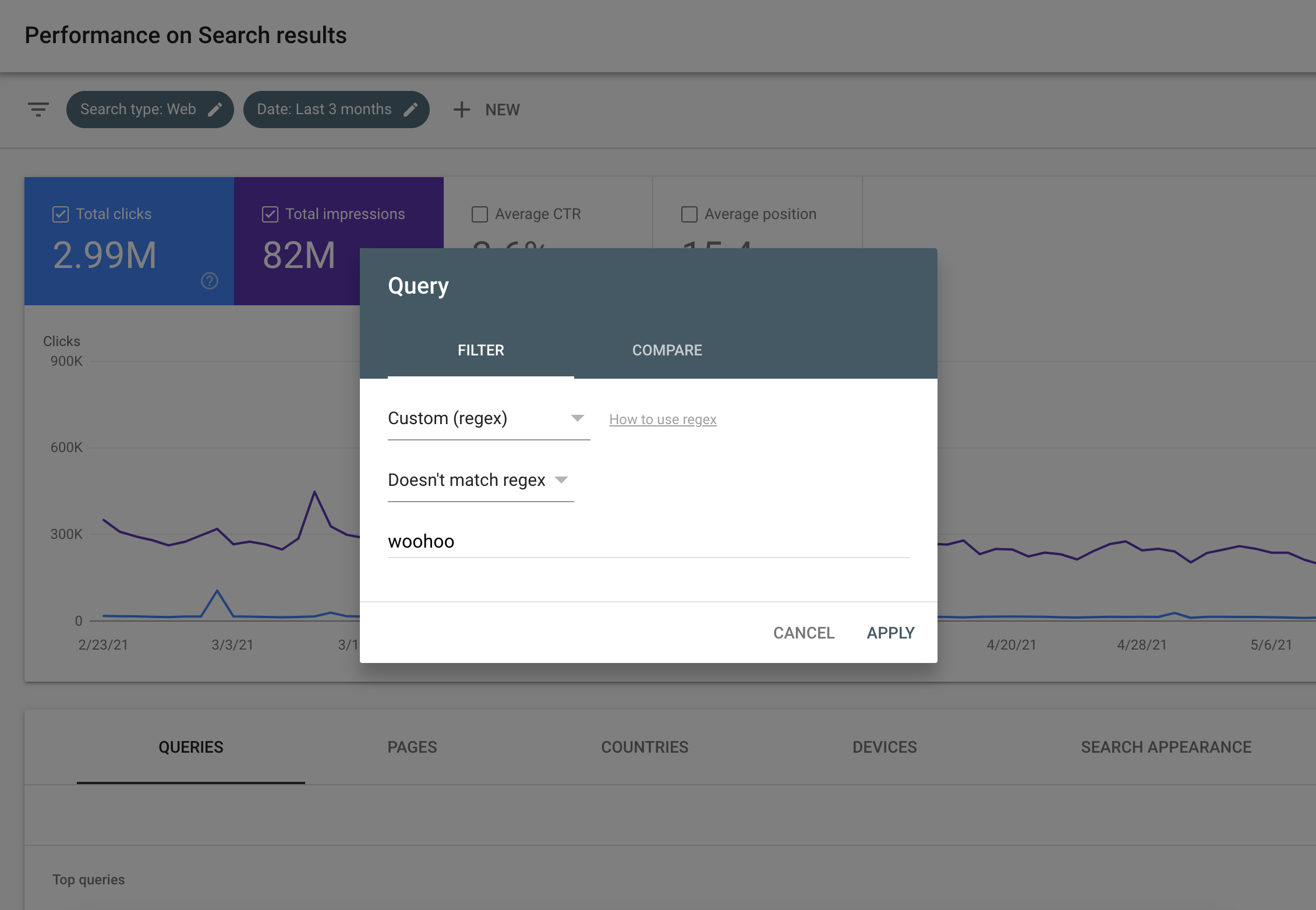Rabu 2 Juni 2021
Baru-baru ini, kami mengumumkan peningkatan pemfilteran data untuk laporan Performa Search Console, dan kami senang melihat reaksi komunitas terhadap pengumuman ini.
Kami selalu tertarik dengan masukan yang kami terima. Kami juga melihat banyak permintaan untuk melengkapi pembaruan ini dengan menambahkan opsi pencocokan negatif ke filter ekspresi reguler (regex).
Kabar baiknya, mulai hari ini filter laporan Performa mendukung filter ekspresi reguler baik yang cocok maupun tidak cocok. Opsi tersedia di dropdown sekunder, yang muncul setelah memilih opsi "Kustom (ekspresi reguler)" di pemilih filter, seperti yang ditunjukkan pada screenshot di bawah. Pelajari lebih lanjut cara memfilter data performa penelusuran.

Tips ringkas mengenai cara menggunakan ekspresi reguler di Search Console
Tips ringkas berikut dapat membantu jika Anda baru mempelajari cara menggunakan ekspresi reguler.
Pertama-tama, apa yang dimaksud dengan ekspresi reguler? Singkatnya, ekspresi reguler adalah urutan karakter yang menentukan pola penelusuran. Anda dapat menggunakannya untuk membuat filter lanjutan guna menyertakan atau mengecualikan lebih dari sekadar kata atau frasa. Saat menggunakan ekspresi reguler, Anda dapat menggunakan sejumlah karakter meta, yakni karakter yang memiliki makna khusus, misalnya untuk menentukan kriteria penelusuran. Lihat referensi sintaksis ekspresi reguler RE2 untuk referensi terkait semua karakter meta yang didukung oleh Search Console.
Jika Anda belum tahu, berikut beberapa contoh terkait kapan harus menggunakan ekspresi reguler, bukan filter lain:
- Menetapkan segmentasi pengguna yang sudah mengetahui merek Anda - Gunakan ekspresi reguler yang menentukan beberapa varian dari nama perusahaan Anda,
termasuk varian nama yang salah ketik. Hal ini akan memberi tahu Anda jenis kueri apa yang digunakan di setiap grup dan bagian situs mana yang menarik perhatian setiap audiens.
Misalnya, jika nama perusahaan Anda
Willow Tree, sebaiknya Anda membuat filter untuk semua varian seperti ini:willow tree|wilow tree|willowtree|willowtee(karakter meta|mewakili pernyataan OR). - Menganalisis traffic ke bagian situs - Gunakan ekspresi reguler yang berfokus pada direktori tertentu di situs Anda. Tindakan ini dapat membantu Anda
memahami apa saja kueri umum di setiap area konten. Misalnya, jika struktur URL Anda
example.com/[product]/[brand]/[size]/[color]dan ingin melihat traffic yang mengarah ke sepatu hijau, terlepas dari merek atau ukurannya, Anda dapat menggunakanshoes/.*/green(.*cocok dengan karakter apa pun beberapa kali). - Memahami maksud pengguna - Gunakan ekspresi reguler untuk menganalisis jenis kueri apa yang membawa pengguna ke berbagai bagian situs Anda.
Misalnya, Anda mungkin tertarik dengan kueri yang berisi kata pertanyaan; filter kueri
what|how|when|whymungkin menampilkan hasil yang menunjukkan bahwa konten Anda dapat menjawab pertanyaan tersebut dengan mudah, mungkin melalui FAQ. Contoh lain adalah kueri yang berisi (atau tidak berisi) kata transaksional sepertibuy|purchase|order. Kueri ini mungkin juga menampilkan nama produk mana yang lebih umum atau jarang digunakan dengan ekspresi tersebut.
Lihat pusat bantuan Search Console untuk mengetahui ekspresi
reguler umum. Jika Anda memiliki contoh penggunaan ekspresi reguler yang keren, bagikan di Twitter menggunakan hashtag #performanceregex.
Jika ada pertanyaan atau masalah, hubungi kami di Komunitas Pusat Google Penelusuran atau di Twitter.
